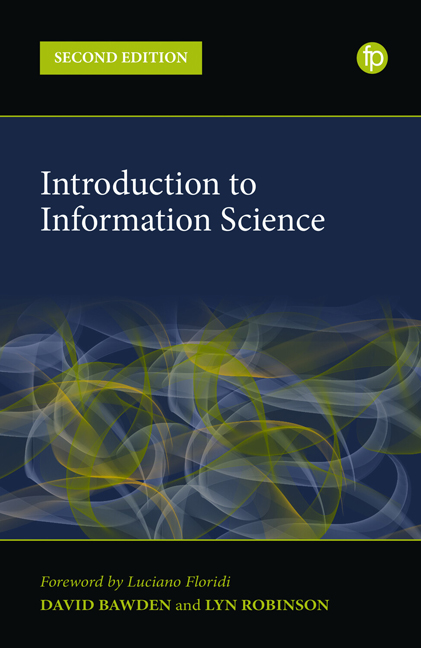Book contents
- Frontmatter
- Contents
- Figures
- Preface
- Foreword – Curators of Semantic Capital
- List of Acronyms
- 1 The Information Science Discipline
- 2 History of Information: the Story of Documents
- 3 Philosophies of Information
- 4 Paradigms, Turns and Theories in the Information Sciences
- 5 Information
- 6 Documents and Documentation
- 7 Domain Analysis
- 8 Information Organisation
- 9 Digital Technologies and Data Systems
- 10 Information Systems
- 11 Informetrics
- 12 Information Behaviour
- 13 Communicating Information: Changing Contexts
- 14 Information Management and Policy
- 15 Information Law and Ethics
- 16 Information Society
- 17 Digital (Onlife) Literacies
- 18 Research in the Information Sciences
- 19 The Future of the Information Sciences
- Additional Resources
- Index
4 - Paradigms, Turns and Theories in the Information Sciences
Published online by Cambridge University Press: 21 April 2022
- Frontmatter
- Contents
- Figures
- Preface
- Foreword – Curators of Semantic Capital
- List of Acronyms
- 1 The Information Science Discipline
- 2 History of Information: the Story of Documents
- 3 Philosophies of Information
- 4 Paradigms, Turns and Theories in the Information Sciences
- 5 Information
- 6 Documents and Documentation
- 7 Domain Analysis
- 8 Information Organisation
- 9 Digital Technologies and Data Systems
- 10 Information Systems
- 11 Informetrics
- 12 Information Behaviour
- 13 Communicating Information: Changing Contexts
- 14 Information Management and Policy
- 15 Information Law and Ethics
- 16 Information Society
- 17 Digital (Onlife) Literacies
- 18 Research in the Information Sciences
- 19 The Future of the Information Sciences
- Additional Resources
- Index
Summary
It can scarcely be denied that the supreme goal of all theory is to make the irreducible basic elements as simple and as few as possible without having to surrender the adequate representation of a single datum of experience.
Albert Einstein (Herbert Spencer Lecture, Oxford, 10 June 1933)You can work out all the theories you like, but the real world is more complex than your theories.
Claude Shannon (quoted in Soni, 2019)Introduction
In this chapter we consider paradigms and turns, approaches to the study of the information disciplines and the practice of the information professions, which are generally regarded as more specific and contextual than the philosophies discussed in the previous chapter. We then consider the role of theory in information science. A theory is regarded as more specific and contextualised than a paradigm, although types of theory are closely associated with particular paradigms. However, the terms are not used consistently, and the philosophy–paradigm–theory hierarchy is not strictly observed in writings on information science.
Paradigms and turns
The Oxford English dictionary (December 2020) defines a paradigm, in the sense in which the term is used here, as ‘a conceptual or methodological model underlying the theories and practices of a science or discipline at a particular time; hence a generally accepted world view’. The term, brought into common use by the philosopher of science Thomas Kuhn (1922–96) in his work on scientific revolutions, describes a collection of beliefs about the subject matter of a subject, and a set of agreements about how the subject should be studied. Acceptance of a paradigm is therefore mainly applicable to academic study and research, but it also influences practice, since it encapsulates a view of what a subject is like on the whole. It is important to realise that the emergence of a new paradigm does not mean the cessation of work based in older paradigms; the process is more one of addition, and perhaps gradual replacement. Information science has certainly seen several paradigms operating at the same time. This is somewhat different to Kuhn's original concept, by which there would usually be a single paradigm for a science, and a new paradigm would replace the old quite rapidly.
- Type
- Chapter
- Information
- Introduction to Information Science , pp. 63 - 80Publisher: FacetPrint publication year: 2022



